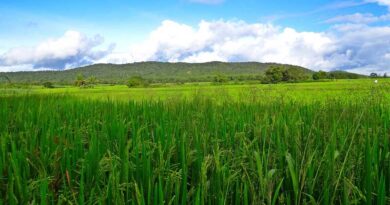Beyond Stocks: How Farmland Offers a Haven in the Storm of Market Uncertainty
Guest Author: Mr. Vijay Chaudhary, Chairman of Ram Rattan Group and Dalmia Ram Rattan
28 March 2024, New Delhi: In the tumultuous Indian stock market, recent losses have rattled investors, reaffirming the wisdom of Louis Glickman, the real estate investor, who famously stated, “The best investment on Earth is Earth.” The abrupt crash of Sensex, erasing Rs. 13.5 lakh crore in a single day, highlights the imperative for stability. Amidst pervasive uncertainty, farmland stands out as a promising investment, offering stability and high returns.

Chairman
of Ram Rattan Group
and Dalmia Ram Rattan
According to an IBEF report, the Indian agriculture sector experienced a significant surge in investments between April 2000 and December 2022, with total foreign direct investment inflows amounting to USD 2,708.72 million. Amidst market turbulence, investors are exploring diverse avenues for stability and Farmland is becoming a strong option for them. As it offers many benefits and opportunities for people looking to strengthen their investments.
Farmland: A Promising Investment
Farmland stands out as a sound investment choice primarily due to its consistent returns over the long term, contrasting with the volatility often seen in stocks, mutual funds, and SIPs. Its value tends to appreciate steadily due to the continuous rise in population and crop prices. This stability attracts investors seeking high returns with none to minimal risk exposure. Farmland also offers multiple income avenues, including leasing to farmers, renting out farm buildings, or engaging in direct agricultural activities such as crop cultivation or livestock farming.
Societal Impact & Generational Wealth
Investing in farmland not only promotes societal objectives like sustainability and food security but also champions environmentally conscious agricultural practices. By investing in farmland, individuals actively contribute to building a more resilient and sustainable future. Furthermore, they play a crucial role in bolstering food security and supporting rural development by maintaining the productivity of agricultural land. Moreover, farmland investments enable the preservation of such land for the benefit of future generations, ensuring its availability and utility for years to come.
Tax Advantages
In many jurisdictions, farmland ownership comes with tax advantages, such as deductions for expenses related to agricultural activities and favorable capital gains treatment. In some cases, investors can benefit from tax deductions related to expenses such as maintenance, improvements, and property taxes.
Farmland: The Path to Stability and Growth
Farmland presents a durable investment for intergenerational prosperity, boasting intrinsic value and enduring demand. Its tangible nature ensures stability amid market volatility, serving as a hedge against inflation and economic downturns. With global population growth and diminishing arable land, its worth appreciates over time. It yields consistent income through crop yields or rentals, delivering sustained
returns. Unlike volatile financial assets, farmland offers tangible assets with potential tax advantages. Its multi-generational appeal lies in wealth preservation and leaving a tangible legacy. Strategic location and sustainable practices, such as those found in areas like Naugaon near the Delhi-Mumbai expressway, enhance agro-farm success and value growth.
(For Latest Agriculture News & Updates, follow Krishak Jagat on Google News)















